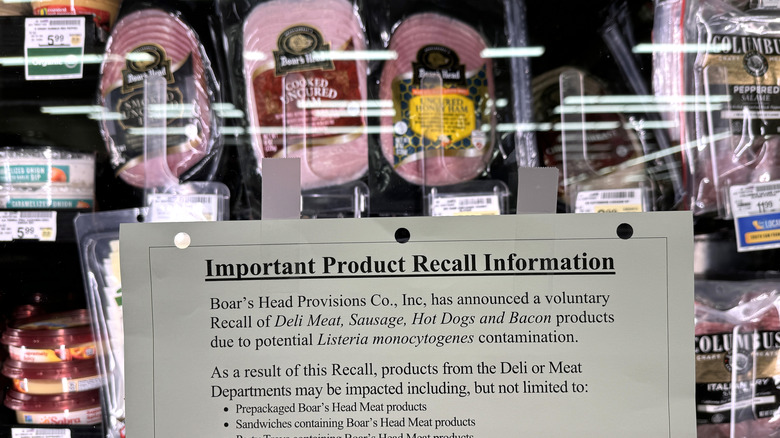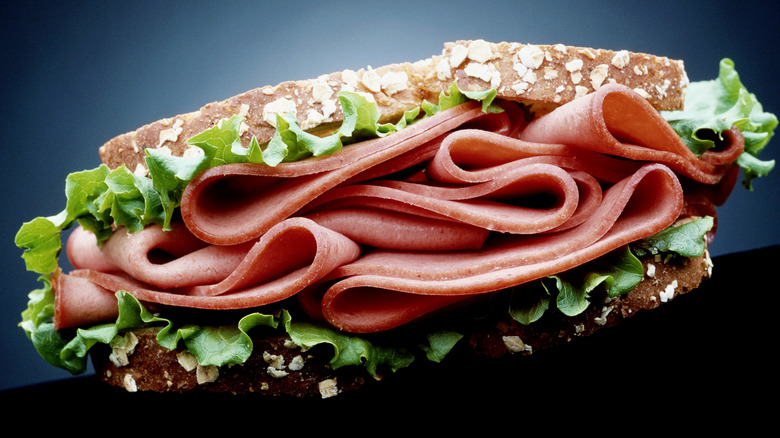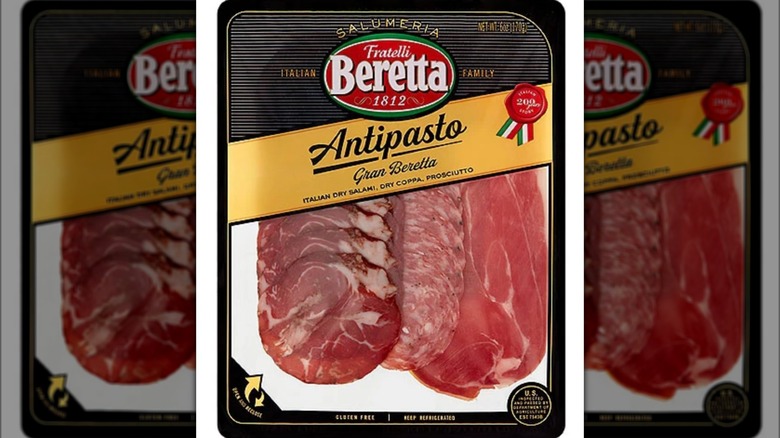9 Of The Worst Deli Meat Recalls In History
Pretty much any food has the capacity to be recalled for one reason or another, but for some reason, deli meat is especially susceptible to recalls. You can use deli meat for a lot of things, but these ready-to-eat slices are particularly prone to contamination, with bacteria like Listeria and Salmonella potentially getting into them through infected animal tissue or milk, or through improper handling or storage. This susceptibility, combined with their mass-produced nature, has led to some pretty big recalls of deli meats throughout the years, with millions of pounds of products having to be tracked down by food producers.
Sadly, some of these recalls have not happened quickly enough to prevent illness or death. Several recalls throughout history have been accompanied by wide scale sickness, with events like the 2008 Canadian Listeriosis outbreak resulting in multiple people losing their lives. Other recalls have been accompanied by legal action due to the grave consequences that they led to. Thankfully, not all deli meat recalls have been due to bacterial contamination — but that doesn't mean that they were any less risky. Ready to take a deep dive into food safety history? Let's take a look at some of the worst deli meat recalls ever. Just make sure you're not munching on a ham sandwich while you're reading this one, folks.
1. In 2024, a Listeria outbreak prompted a 7 million-pound recall
Boar's Head is one of the most prominent deli meat producers in the country. In 2024, though, its reputation was damaged enormously after a massive Listeria outbreak in its products caused dozens of sicknesses and multiple deaths. The outbreak was first discovered when Boar's Head-brand liverwurst was tested by health professionals who found the presence of Listeria. The officials soon traced the issue back to a Boar's Head plant in Jarratt, Virginia, which seemed to be the potential epicenter of the outbreak.
This recall started small, but soon ballooned to massive proportions. At first, approximately 200,000 pounds of product was recalled. While this was a sizable number, it was nothing compared to the expanded recall of over 7 million pounds of deli meats. It wasn't just liverwurst that was recalled, either: Dozens of different Boar's Head items were sought out by the company due to their potential for contamination. These didn't just encompass deli meats, but also included frankfurters, bacon, and olive loaf, with multiple products with the Old Country brand name recalled too. All the more reason to make your own deli meat at home, right?
2. Sara Lee had to conduct a massive recall in 1998
It's fair to say that deli meats aren't necessarily the star of Sara Lee's product line. Most people flock to the brand for its cakes and baked goods instead of its sliced ham and turkey. That might be due to a significant knock to its reputation for producing safe deli meats in the late '90s, which has arguably hung over the company since. Sara Lee was one brand that was hit by a massive Listeriosis outbreak in 1998, which affected products manufactured by Bil Mar Foods and prompted a huge recall of products. The scale of the outbreak is not to be understated: 11 states were affected, with over 80 people becoming sick and 15 people dying in total.
Roughly 35 million pounds of product had to be recalled and the outbreak hit Sara Lee's sales hard, costing the company a grand total of $76 million. This was just in its share prices, too, and didn't account for any lower sales due to reputational damage. Although Sara Lee's sales bounced back fairly quickly, that wasn't the end of its problems. In 2001, the food company pleaded guilty to federal criminal charges due to its hand in the outbreak and subsequent recall.
3. A 2002 recall of Pilgrim's Pride deli meat covered over 27 million pounds of deli meat
Pilgrim's Pride Foods faced arguably its biggest challenge to date back in 2022, when one of its plants was discovered as the source of an almighty Listeriosis outbreak. This outbreak swept across the Northeastern states, infecting dozens of people and causing multiple deaths – and it was all prompted by simple, unassuming sliced turkey deli meat. All of the affected meat was produced over a span of five months, which made the scale of the recall absolutely massive. As such, Pilgrim's Pride had to seek out approximately 27.4 million pounds of its products, which we can imagine wasn't the easiest job in the world to do.
As well as turkey products, Pilgrim's Pride also recalled cooked chicken products, in a bid to cover all the bases. Unfortunately, this wouldn't be the last time that the food company was affected by potential contamination and recalls. In 2016, the company had to recall over 5.5 million pounds of cooked chicken products, due to the fact that they may have been contaminated with extraneous pieces of metal. A similar recall had to be put out in 2020, when it was discovered that pieces of plastic might have made it into its chicken nuggets.
4. A 2008 Listeriosis outbreak in Canada caused an enormous recall
One of the most notorious Listeriosis outbreaks in history occurred in Canada towards the end of the 2000s. It all began in February 2008, when Listeria test results undertaken at a Maple Leaf Foods plant began to come back positive. As a result, management at the plant undertook safety and hygiene precautions to get rid of any Listeria infection, and it was then assumed that the problem was dealt with.
However, a combination of communication issues and lack of poor trend analysis led to the problem recurring and growing, and by June 2008, the outbreak was in full swing. Over the next few months, Listeriosis began to affect multiple vulnerable individuals, ultimately resulting in 57 illnesses and 22 deaths. The outbreak was accompanied by an enormous recall of Maple Leaf Foods meat products, with a grand total of 191 different products recalled by the company.
This Listeriosis outbreak caused a massive stir not just because of the tragic deaths it caused, but because of its relatively novel nature in Canada, which up until this point hadn't had to deal with such a massive Listeria problem. The conclusion of the outbreak was accompanied by a full independent investigation into its causes, and how to prevent future health crises like this one in future.
5. 172 tons of deli meat had to be recalled in 2010 due to Listeria
Back in 2010, Zemco Industries had an almighty battle on its hands. The Buffalo-based establishment had to recall a massive amount of deli meat – 172 tons, to be exact – when it was discovered that it could potentially be contaminated with Listeria. The meat was used in "Grab & Go" sandwiches that were sold in Walmart, and black forest ham, hot ham, hard salami, pepperoni, and slices of roast beef were all thought to be potentially affected. The recall turned out to be one of those recalls that would always haunt Walmart, and it cost the company a pretty penny.
Thankfully, there were a few mitigating factors that meant that this recall wasn't as bad as some others. The first was the relatively small window that the affected products were produced in, occurring over a span of roughly two weeks, as opposed to several months like other major recalls. The second was how impactful the outbreak was. At the time of recall, there were no illnesses reported in connection with eating the contaminated deli meat, and the Listeria's presence was instead discovered through routine testing. A large proportion of the recalled product was also able to be recovered, potentially limiting how much damage it could do.
6. A massive recall of roast beef and ham occurred in 2013
Roast beef and deli ham are staple purchases for many people — but if you were buying them back in 2013, you might have found yourself in a little bit of trouble. In April of that year, Louisiana-based firm Manda Packing Company had to put out a recall of 468,000 pounds of product. The reason? The same one as so many other recalls: It was thought that its products could have been contaminated with Listeria, posing a massive health risk to a huge amount of people.
Things were made even more difficult for the Manda Packing Company by the fact that these deli meat products had been shipped to 13 states at the time of recall. Plus, while roast beef and deli ham were some of the most prominent items to be recalled, they were far from the only ones. Turkey breast, corned beef, pastrami, tasso pork, and hog's head cheese products were all also thought to be contaminated and were subject to recall. The products were all made over a period of several months, making tracking them down even harder.
7. Over 85,000 pounds of prosciutto had to be recalled after lack of thorough inspection
Ah, finally. A recall that wasn't because of Listeria contamination. Hey, we probably shouldn't be celebrating that fact, but still, it's nice to look at something different, huh? In April 2024, just over 85,000 pounds of prosciutto had to be recalled by ConSup North America after it was shipped to stores across the country. The reason for the recall was that some of the product was produced in Germany, and they were then exported to the United States to be distributed without equivalent inspection.
This essentially means that the prosciutto wasn't necessarily inspected using the same benchmarks or standards that the Food Safety & Inspection Service uses in the U.S., or that the company behind its production couldn't specifically demonstrate that it was inspected to the same level. This could create a potential safety issue and limit the lack of information available to health bodies and consumers alike. Luckily, no illnesses or adverse reactions had been reported to prompt this recall.
8. A wide scale Salmonella outbreak was linked to a range of charcuterie meats
A well-designed charcuterie board stuffed with meats is a classy, elegant affair — but not when there's illness involved. Unfortunately, towards the start of 2024 that was the situation, as New Jersey-based Fratelli Beretta was battling with a recall of its meat charcuterie products. It was found that the coppa ham in the charcuterie products may have been underprocessed, leaving it susceptible to Salmonella pathogens that had worked their way into the food. Regrettably, by the time the problem was identified, the products had been distributed to stores nationwide.
Fratelli Beretta had a lot of work on its hands to get its products back, and unfortunately it didn't manage to do so in time to prevent people becoming ill. A wide scale Salmonella outbreak occurred, with over 100 people becoming sick and 27 being hospitalized across 33 states. The saving grace of the outbreak was that no one died, but there's no denying that it was still incredibly serious. It wasn't just Fratelli Beretta brand charcuterie items that were affected either, as store-brand charcuterie products sold by Aldi, Black Bear, Lidl, and Publix were also impacted by the Salmonella outbreak.
9. BJ's Wholesale Club had to undertake a large recall of its deli meats due to undeclared pistachios
BJ's Wholesale Club is the place to go if you want to buy a lot of something in one go. However, in 2016 that could have left you with a lot of deli meat that you'd subsequently have to take back to the store. That's because BJ's Wholesale Club had to undertake a large recall of its deli meats that year due to the potential of undeclared traces of pistachio being in the product. It was found that the deli meat had potentially been in contact with equipment that had been used to prepare mortadella sold by the store — mortadella (which is made from steamed sausage) that had pistachios in it, which hadn't previously been expected by BJ's.
This, of course, created a headache for BJ's due to the potential for an allergic reaction and the risk to customers' health. It's worth pointing out that BJ's had mistakenly received the wrong mortadella, and so this error wasn't exactly the fault of the store itself. However, as the meat was sold in stores in eight states over a period of two weeks, it left the store with an almighty task to try and get the affected product back.









